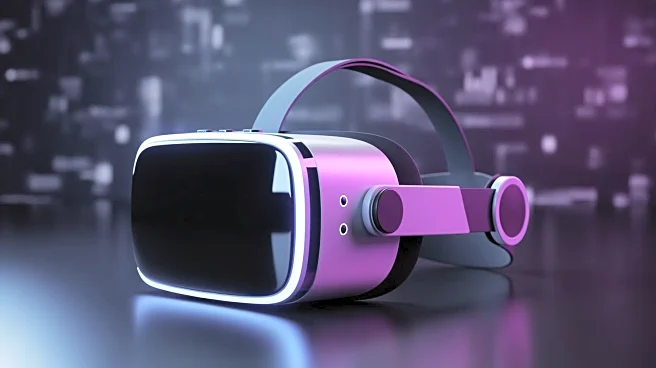What's Happening?
Valve is preparing to launch its new VR headset, the Steam Frame, which is positioned to compete with Meta's Quest 3 and Quest 3S. The Steam Frame offers features such as a better chip, more RAM, and stronger Wi-Fi support compared to Meta's devices.
It is designed as a streaming-first device, allowing users to connect wirelessly to their gaming PCs for enhanced gaming experiences. The headset includes foveated streaming technology, which improves image resolution based on where the user is looking. Valve's approach contrasts with Meta's focus on AI and the metaverse, as Valve aims to provide a straightforward gaming experience without extensive data collection.
Why It's Important?
Valve's entry into the VR market with the Steam Frame could disrupt Meta's current dominance, offering consumers an alternative with potentially superior technical specifications. This competition may drive innovation and improvements in VR technology, benefiting end-users with better performance and features. Valve's focus on gaming and streaming aligns with the interests of dedicated gamers, potentially attracting a niche market. The presence of a strong competitor could also pressure Meta to refine its offerings and address consumer concerns about privacy and data usage.
What's Next?
The success of Valve's Steam Frame will depend on its pricing strategy and market reception. If priced competitively, it could capture a significant share of the VR market, challenging Meta's position. Industry observers will watch for consumer feedback and sales figures to assess the impact of Valve's entry. Meta may respond by enhancing its VR products or adjusting its pricing to maintain its market lead. The development of VR technology and applications will likely continue to evolve, influenced by the competition between these major players.
Beyond the Headlines
Valve's approach to VR, focusing on gaming and streaming, highlights a shift away from the broader social and AI-driven initiatives pursued by Meta. This could appeal to consumers seeking a more traditional gaming experience without the complexities of the metaverse. The competition between Valve and Meta may also raise discussions about privacy, data collection, and the ethical implications of VR technology. As VR becomes more mainstream, these considerations will play a crucial role in shaping consumer preferences and industry standards.















